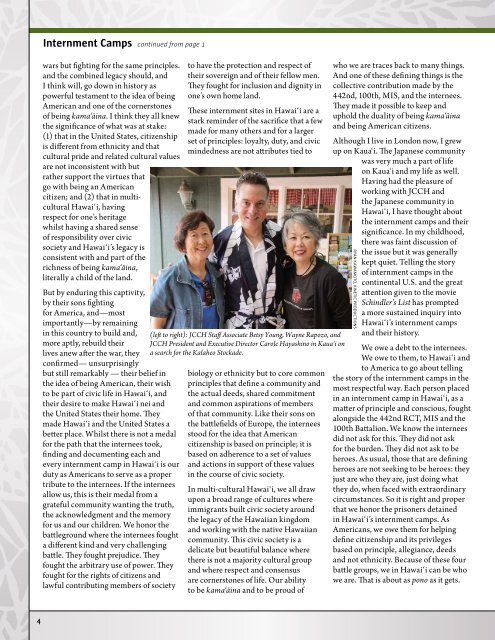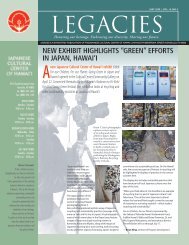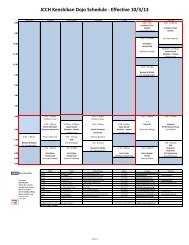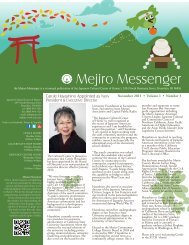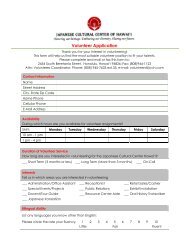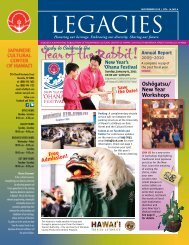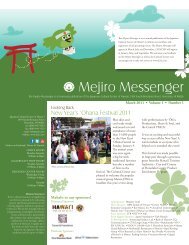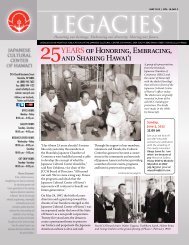Legacies - Japanese Cultural Center of Hawaii
Legacies - Japanese Cultural Center of Hawaii
Legacies - Japanese Cultural Center of Hawaii
- No tags were found...
Create successful ePaper yourself
Turn your PDF publications into a flip-book with our unique Google optimized e-Paper software.
Internment Camps continued from page 1wars but fighting for the same principles.and the combined legacy should, andI think will, go down in history aspowerful testament to the idea <strong>of</strong> beingAmerican and one <strong>of</strong> the cornerstones<strong>of</strong> being kama‘āina. I think they all knewthe significance <strong>of</strong> what was at stake:(1) that in the United States, citizenshipis different from ethnicity and thatcultural pride and related cultural valuesare not inconsistent with butrather support the virtues thatgo with being an Americancitizen; and (2) that in multiculturalHawai‘i, havingrespect for one’s heritagewhilst having a shared sense<strong>of</strong> responsibility over civicsociety and Hawai‘i’s legacy isconsistent with and part <strong>of</strong> therichness <strong>of</strong> being kama‘āina,literally a child <strong>of</strong> the land.But by enduring this captivity,by their sons fightingfor America, and—mostimportantly—by remainingin this country to build and,more aptly, rebuild theirlives anew after the war, theyconfirmed— unsurprisinglybut still remarkably — their belief inthe idea <strong>of</strong> being American, their wishto be part <strong>of</strong> civic life in Hawai‘i, andtheir desire to make Hawai‘i nei andthe United States their home. Theymade Hawai‘i and the United States abetter place. Whilst there is not a medalfor the path that the internees took,finding and documenting each andevery internment camp in Hawai‘i is ourduty as Americans to serve as a propertribute to the internees. If the interneesallow us, this is their medal from agrateful community wanting the truth,the acknowledgment and the memoryfor us and our children. We honor thebattleground where the internees foughta different kind and very challengingbattle. They fought prejudice. Theyfought the arbitrary use <strong>of</strong> power. Theyfought for the rights <strong>of</strong> citizens andlawful contributing members <strong>of</strong> societyto have the protection and respect <strong>of</strong>their sovereign and <strong>of</strong> their fellow men.They fought for inclusion and dignity inone’s own home land.These internment sites in Hawai‘i are astark reminder <strong>of</strong> the sacrifice that a fewmade for many others and for a largerset <strong>of</strong> principles: loyalty, duty, and civicmindedness are not attributes tied to(left to right): JCCH Staff Associate Betsy Young, Wayne Rapozo, andJCCH President and Executive Director Carole Hayashino in Kaua‘i ona search for the Kalaheo Stockade.biology or ethnicity but to core commonprinciples that define a community andthe actual deeds, shared commitmentand common aspirations <strong>of</strong> members<strong>of</strong> that community. Like their sons onthe battlefields <strong>of</strong> Europe, the interneesstood for the idea that Americancitizenship is based on principle; it isbased on adherence to a set <strong>of</strong> valuesand actions in support <strong>of</strong> these valuesin the course <strong>of</strong> civic society.In multi-cultural Hawai‘i, we all drawupon a broad range <strong>of</strong> cultures whereimmigrants built civic society aroundthe legacy <strong>of</strong> the <strong>Hawaii</strong>an kingdomand working with the native <strong>Hawaii</strong>ancommunity. This civic society is adelicate but beautiful balance wherethere is not a majority cultural groupand where respect and consensusare cornerstones <strong>of</strong> life. Our abilityto be kama‘āina and to be proud <strong>of</strong>who we are traces back to many things.And one <strong>of</strong> these defining things is thecollective contribution made by the442nd, 100th, MIS, and the internees.They made it possible to keep anduphold the duality <strong>of</strong> being kama‘āinaand being American citizens.Although I live in London now, I grewup on Kaua‘i. The <strong>Japanese</strong> communitywas very much a part <strong>of</strong> lifeon Kaua‘i and my life as well.Having had the pleasure <strong>of</strong>working with JCCH andthe <strong>Japanese</strong> community inHawai‘i, I have thought aboutthe internment camps and theirsignificance. In my childhood,there was faint discussion <strong>of</strong>Ryan Kawamoto, Kinetic Productionsthe issue but it was generallykept quiet. Telling the story<strong>of</strong> internment camps in thecontinental U.S. and the greatattention given to the movieSchindler’s List has prompteda more sustained inquiry intoHawai‘i’s intern ment campsand their history.We owe a debt to the internees.We owe to them, to Hawai‘i andto America to go about tellingthe story <strong>of</strong> the internment camps in themost respectful way. Each person placedin an internment camp in Hawai‘i, as amatter <strong>of</strong> principle and conscious, foughtalongside the 442nd RCT, MIS and the100th Battalion. We know the interneesdid not ask for this. They did not askfor the burden. They did not ask to beheroes. As usual, those that are definingheroes are not seeking to be heroes: theyjust are who they are, just doing whatthey do, when faced with extraordinarycircumstances. So it is right and properthat we honor the prisoners detainedin Hawai‘i’s internment camps. AsAmericans, we owe them for helpingdefine citizenship and its privilegesbased on principle, allegiance, deedsand not ethnicity. Because <strong>of</strong> these fourbattle groups, we in Hawai‘i can be whowe are. That is about as pono as it gets.4


